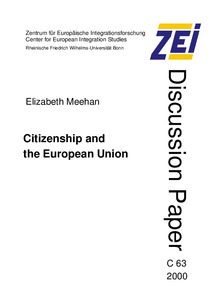Meehan, Elizabeth: Citizenship and the European Union. Bonn: Zentrum für Europäische Integrationsforschung (ZEI), 2000. In: ZEI Discussion Paper, C63.
Online-Ausgabe in bonndoc: https://hdl.handle.net/20.500.11811/10231
Online-Ausgabe in bonndoc: https://hdl.handle.net/20.500.11811/10231
@techreport{handle:20.500.11811/10231,
author = {{Elizabeth Meehan}},
title = {Citizenship and the European Union},
publisher = {Zentrum für Europäische Integrationsforschung (ZEI)},
year = 2000,
series = {ZEI Discussion Paper},
volume = C63,
note = {The idea and practice of European citizenship is relevant in two main ways to the recent controversy in Germany over plans by the governing Social-Democratic Party to reform citizenship law. One of these is that the concepts of citizenship and nationality continue to be thought of as synonymous in Germany but are now relatively distinct, both linguistically and politically, in several other national regimes and in the European Union (EU). Secondly, on the one hand, new German provisions will be more similar than before to the nationality laws of other member states by introducing a right [as opposed to a discretionary possibility] to citizenship through residence and legal naturalization, as well as ancestry. But, on the other, the decision on 16 March 1999 to abandon the possibility of dualcitizenship [or, in my language, nationality] means that, in this respect, the German approach to citizenship now runs counter to suggestions made by some specialists about the EU as a site of democratic practice.
This paper will open with a brief discussion of the distinctiveness of citizenship and nationality. This is necessary so that one can understand the following section outlining EU provisions. In conclusion, this paper will discuss some of the arguments about the prospects for EU citizenship, with special reference to loosening the overlap between the legal label of national identity and the normative practice of citizenship.},
url = {https://hdl.handle.net/20.500.11811/10231}
}
author = {{Elizabeth Meehan}},
title = {Citizenship and the European Union},
publisher = {Zentrum für Europäische Integrationsforschung (ZEI)},
year = 2000,
series = {ZEI Discussion Paper},
volume = C63,
note = {The idea and practice of European citizenship is relevant in two main ways to the recent controversy in Germany over plans by the governing Social-Democratic Party to reform citizenship law. One of these is that the concepts of citizenship and nationality continue to be thought of as synonymous in Germany but are now relatively distinct, both linguistically and politically, in several other national regimes and in the European Union (EU). Secondly, on the one hand, new German provisions will be more similar than before to the nationality laws of other member states by introducing a right [as opposed to a discretionary possibility] to citizenship through residence and legal naturalization, as well as ancestry. But, on the other, the decision on 16 March 1999 to abandon the possibility of dualcitizenship [or, in my language, nationality] means that, in this respect, the German approach to citizenship now runs counter to suggestions made by some specialists about the EU as a site of democratic practice.
This paper will open with a brief discussion of the distinctiveness of citizenship and nationality. This is necessary so that one can understand the following section outlining EU provisions. In conclusion, this paper will discuss some of the arguments about the prospects for EU citizenship, with special reference to loosening the overlap between the legal label of national identity and the normative practice of citizenship.},
url = {https://hdl.handle.net/20.500.11811/10231}
}






